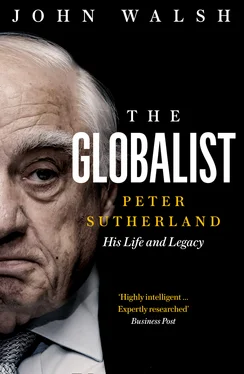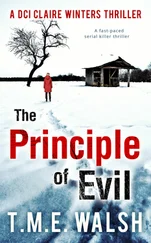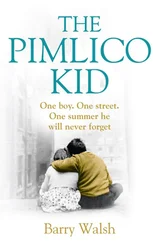The attorney general’s office at the time was in the basement of the Department of An Taoiseach, with the Taoiseach’s office on the first floor. Lillis had an office next door to FitzGerald. Alexis FitzGerald, the Taoiseach’s special adviser (the two were unrelated), also had an office on the first floor. Liam Hourican, who would become Sutherland’s deputy chef de cabinet in Brussels, was at that stage the government press secretary. Declan Kelly, the Taoiseach’s private secretary, completed Garret FitzGerald’s inner circle.
Lillis and Sutherland would go for a coffee every day in a café across the road from Government Buildings. ‘There was a confectionery shop and a café. We would go there every morning about eleven. Peter was very fond of the cakes, but he was clearly under instructions not to be eating so many of the things. He used to hold them behind his back in case I would see them. And then he would gobble it. He had a weakness in that regard,’ Lillis recalls.
‘He had a very powerful personality, even at that stage. He was extremely good company. He was brilliant but somewhat downright in his views. When he was getting a bit tense about what Garret was up to, he would kick my door open and come in and utter a few very rude words and accuse me of screwing up. It was just a way of letting off steam. I always enjoyed it though.’
Lillis, Sutherland, the Taoiseach and Alexis FitzGerald would meet regularly to discuss the ongoing hunger strikes in Northern Ireland. IRA inmates in the Maze prison had stopped taking food in protest at the conditions in which Republican prisoners were held, their demands including the right to political prisoner status and to wear civilian clothing. The British government was implacable in its resistance, and when one prisoner, Bobby Sands, died on 5 May 1981, the already volatile situation in Northern Ireland deteriorated still further. The FitzGerald government developed a close relationship with John Hume, the leader of Northern Ireland’s Social Democratic and Labour Party (SDLP), the moderate nationalist party. Hume was a regular visitor to Government Buildings and to the Taoiseach’s private residence.
But FitzGerald wanted to give people in the South a perspective on Northern Ireland Unionism. Even though Ireland was a small country and it was only seventy-five miles between Dublin and Belfast, the border was to all intents and purposes hermetically sealed. Apart from the Troubles being broadcast on RTÉ, very little was known about daily life in the North, particularly among the Unionist community. Equally, people in the North knew very little about what was happening in the South, although where Unionists did have a view it was overwhelmingly negative. The South was seen as insular, economically underdeveloped and controlled by the Catholic Church. In other words, there was no compelling reason why Unionists should extend the hand of friendship south of the border.
Lillis was given the job of finding Unionists to come to Dublin to articulate issues from their viewpoint. ‘I found a group of them. They were barristers. There was a guy called Robert McCartney. He was a very brilliant man but very prejudiced. There was a man called Smith. Both of them were QCs.’ Sutherland, says Lillis, played an important role in persuading both men to come to meetings in Dublin. ‘Peter’s personality and reputation was such that they treated Peter with respect. He was one of the better-known barristers in Dublin.’ The meetings were private, although the government announced that they were taking place and explained what they were intended to achieve.
With the fall of the government in March 1982, Charlie Haughey, the leader of Fianna Fáil, formed the twenty-third Dáil, which lasted until December 1982. During this unstable period, the development was not lost on Margaret Thatcher, and it helped confirm her outlook on Anglo-Irish relations. Throughout 1982, relations between Dublin and London deteriorated further. Thatcher accused Haughey of treachery when in May 1982, he withdrew Irish support for the UK’s United Nations sponsored sanctions of Argentina over the Falklands war. The prospects of a breakthrough in relations with London looked remote when FitzGerald formed the twenty-fourth Dáil at the end of 1982. Sutherland was again appointed attorney general. By the time the new government was formed, Dáithí Ó Ceallaigh had been posted to the Anglo-Irish division of the Department of Foreign Affairs in Dublin. He got to know Sutherland well over this period.
Sutherland’s background and personality, Ó Ceallaigh explains, were very important factors in finding common ground with London: ‘Personalities play a huge role in complex and sensitive negotiations.’ Sutherland developed a close relationship with Sir Michael Havers, the UK attorney general (perhaps better known as the father of the actor, Nigel Havers), and their relationship provided an important axis in negotiations.
‘In the 1980s there was an instinctive dislike among the English of the Irish,’ Ó Ceallaigh says. ‘But equally there was a very simple nationalism in Ireland that was anti-English. Sutherland’s background, particularly his Jesuit education, was not like that. He didn’t have that innate dislike or mistrust of the English. He didn’t feel as if he had to bang on the table as many Fianna Fáil politicians did. It made it very difficult for them to engage with the British. There was a retreat into a green jacket by Irish politicians and the same on the other side. Sutherland was above that. He had an incredible intellectual capacity, a huge moral backbone.’ Sutherland’s attitude, says Ó Ceallaigh, enabled him to engage with the British and convince them not only that they could deal with the Irish, but that the Irish were not in favour of violence.
Lillis agrees with Ó Ceallaigh’s assessment: ‘The role of Sutherland was very important. Sutherland was the right sort of guy to deal with the Brits on these issues. He was never dismissive or hostile.’
FitzGerald instructed Lillis to take the first step in making a series of proposals to the British government. At the time, the main forum of discussion between the two governments was the co-ordinating committee of the Anglo-Irish intergovernmental council. Although it enabled senior officials to meet, in reality it was nothing more than a talking shop, focusing mainly on what the two governments could do together in uncontroversial areas such as agriculture and education.
‘I took an initiative with my opposite number, Sir David Goodall, who was number two in the Cabinet Office to Lord Armstrong. We got the ball rolling,’ Lillis says. ‘I made a bid which was considered to be outrageous by the British. I was setting the bar high. Things were in an appalling condition in Northern Ireland. The Provos’ – the Provisional IRA – ‘were recruiting. The Unionists would not give ground. The SDLP was under pressure. Loyalists were engaged in sectarian shootings. The UK had no idea what to do. I made a proposal that things were so bad there was nothing that the UK could do which would address the issues, or at least put the brakes on in terms of the alienation of the minority nationalist community. I proposed they needed our help. They needed the involvement of the Irish government through security and the court system, including the guards and the army. The idea was that the involvement of the Irish government would help the minority population accept the system of authority in the North. Behind that was our project, which was to have a system of the two governments involved in ruling or governing Northern Ireland.’
FitzGerald, Hume and Sutherland were aware of what Lillis was doing, but very few others at that stage had any idea. To the surprise of the Irish government, Thatcher reacted with interest to Lillis’s proposals. ‘She knew that they were in a mess,’ he says. As a result, exploratory talks began in 1983. The inner circle that were kept privy at all times were the Taoiseach; Dick Spring, the Tánaiste; Peter Barry, the Minister for Foreign Affairs; Michael Noonan, the Minister for Justice; and Sutherland. A marathon negotiation began, which lasted two years. Thirty-six meetings were held over that period, often going on for two or sometimes three days.
Читать дальше












